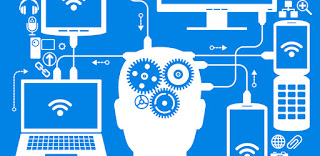Information and communications technology (ICT)
is an
extended term for information technology (IT) which stresses the role of
unified communicationsand the integration of telecommunications (telephone
lines and wireless signals), computers as well as necessary enterprise
software, middleware, storage, and audio-visual systems, which enable users to
access, store, transmit, and manipulate information.
The term ICT is also used to refer to the convergence of
audio-visual and telephone networks with computer networks through a single
cabling or link system. There are large economic incentives (huge cost savings
due to elimination of the telephone network) to merge the telephone network
with the computer network system using a single unified system of cabling,
signal distribution and management.
However, ICT has no universal definition, as "the
concepts, methods and applications involved in ICT are constantly evolving on
an almost daily basis." The broadness of ICT covers any product that will
store, retrieve, manipulate, transmit or receive information electronically in
a digital form, e.g. personal computers, digital television, email, robots. For
clarity, Zuppo provided an ICT hierarchy where all levels of the hierarchy
"contain some degree of commonality in that they are related to
technologies that facilitate the transfer of information and various types of
electronically mediated communications".Skills Framework for the
Information Age is one of many models for describing and managing competencies
for ICT professionals for the 21st century.
The phrase "information and communication
technologies" has been used by academic researchers since the 1980s, and
the abbreviation ICT became popular after it was used in a report to the UK
government by Dennis Stevenson in 1997, and in the revised National Curriculum
for England, Wales and Northern Ireland in 2000. But in 2012, the Royal Society
recommended that ICT should no longer be used in British schools "as it
has attracted too many negative connotations", and with effect from 2014
the National Curriculum uses the word computing, which reflects the addition of
computer programming into the curriculum.
The money spent on IT worldwide has been most recently
estimated as US $3.5 trillion and is currently growing at 5% per year, doubling
every 15 years. The 2014 IT budget of US federal government is nearly $82
billion.IT costs, as a percentage of corporate revenue, have grown 50% since 2002,
putting a strain on IT budgets. When looking at current companies' IT budgets,
75% are recurrent costs, used to "keep the lights on" in the IT
department, and 25% are cost of new initiatives for technology development.








ohhhh hahaha
ReplyDeleteHahahahaha nice keep it up ! Goodluck satin :)
ReplyDeleteThanks for the info!
ReplyDeleteThanks for the info. It helps me a lot in our homework.
ReplyDelete